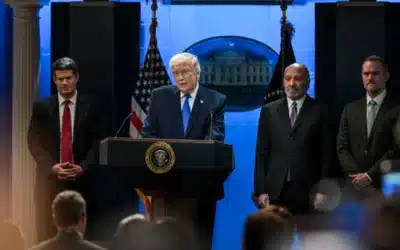President Donald Trump claimed the new military operation in Yemen have devastated the Houthis capabilities
Department of Defense officials are telling Congress behind closed doors that it does not believe the new military campaign in Yemen has degraded the Houthis’ military capabilities. Within a month, the operations will cost over $1 billion.
According to the New York Times, the Pentagon informed Capitol Hill that the new operations against the Houthis – or Ansar Allah – have had “limited success.” The Houthis have reinforced their underground bunker, frustrating the White House.
The private assessment to Congress is far different from the public messages from the White House. “These Houthi strikes have been incredibly successful,” White House Press Secretary Karoline Leavitt said. “Last time I was at this podium, there were more than 100 successful strikes. There have now been over 200 successful strikes – Iran is incredibly weakened as a result of these attacks.”
On March 15, President Donald Trump announced that he would restart President Joe Biden’s bombing campaign in Yemen at an accelerated pace. In January 2024, Biden ordered his Pentagon to attack the Houthis after the group closed the Red Sea to Israeli-linked shipping in an effort to pressure Tel Aviv to end its genocide in Gaza.
Biden’s attacks on Yemen proved ineffective as Ansar Allah expanded the blockade of shipping to US-linked commerce. The group has also attacked US warships in the region and conducted direct missile and drone strikes on Israel.
In January, Hamas and Tel Aviv reached a ceasefire and hostage, leading Ansar Allah to lift its blockade and end attacks on US ships and Israel. After Tel Aviv broke that agreement, the Houthis announced they would reimpose their blockade on Israeli-linked shipping.
In a now infamous Signal chat, Trump’s top national security officials discussed resuming the bombing of Yemen. Vice President JD Vance was the only participant in the chat to dissent, claiming that the bombing campaign benefited Europe at the expense of the American taxpayer.
Vance did not note that the primary beneficiary of the policy is Tel Aviv. In the Signal chat, several officials celebrated the bombing of an apartment building in Yemen’s capital city, believing an Ansar Allah official was inside the structure. That target was hit with intelligence from Tel Aviv.
Officials speaking with the Times confirmed that the Department of Defense continues to use Israeli intelligence to generate targets in Yemen.
During the first week of bombing Yemen, at least 25 civilians were killed in the US strikes. Yemeni officials say a total of 60 civilians have died from the American bombs.
Following the US resumption of the bombing of Yemen, the Houthis have also restated targeting US warships and Israel with missiles.
Trump administration officials have stated that its bombing of Yemen will successfully deter Ansar Allah, even though that policy failed under the previous administration. They argue that heavier strikes will erode the Houthis’ military capabilities.
While the Pentagon said the renewed bombing campaign has not degraded the Houthi power, it has come at a significant price.
The Times reports that the Pentagon has spent $200 million on munitions to strike Yemen. The additional deployment of two aircraft carrier strike groups and B-2 bombers will push the total cost of the operations to over $1 billion next week.
The price of striking Yemen is so high, in part due to Ansar Allah’s air defense capabilities. In recent weeks, the Houthis have downed multiple Reaper Drones. This has led the Pentagon to use longer-range missiles to strike Houthi targets.
Some Defense officials have expressed concern that the administration is using too many munitions in Yemen and degrading the military’s ability to fight a potential war with China.
Reprint from Antiwar.com

































